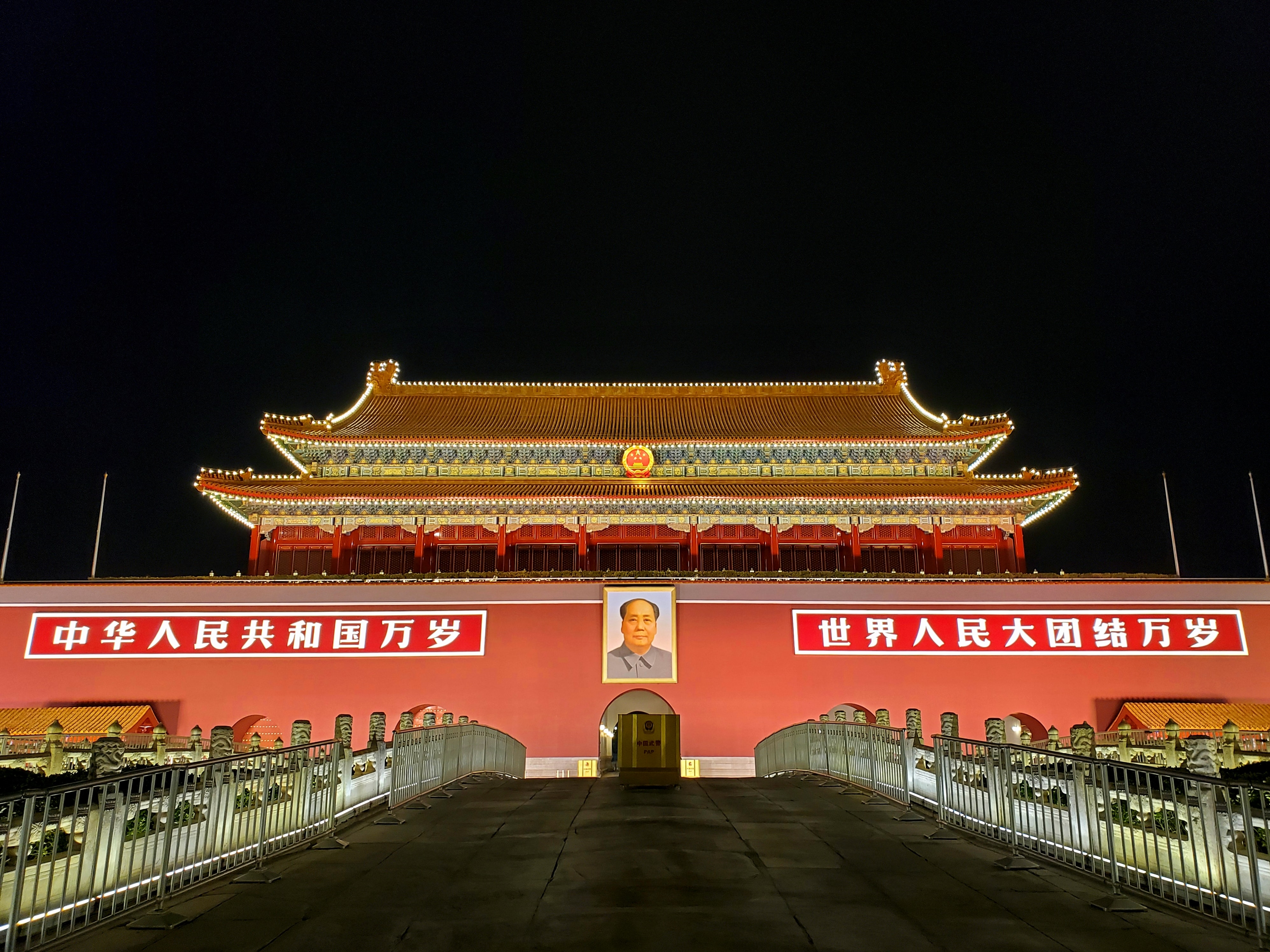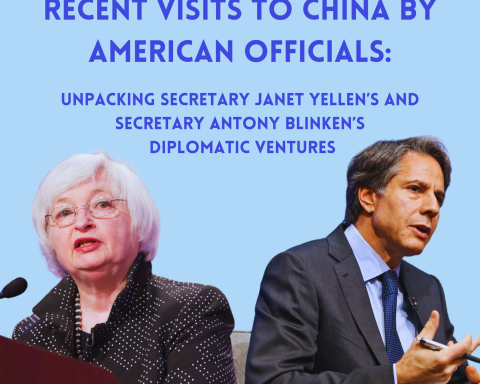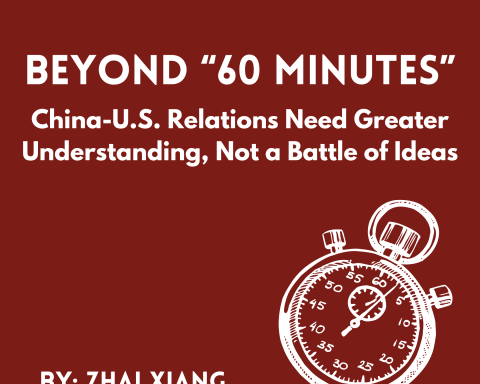This piece is a response to a recent article published on the U.S.-China Perception Monitor. To read the original piece, click here.
President Biden’s decision to organize a virtual Summit for Democracy on December 9 and 10, 2021 has enraged China.
China’s anger stems not only from the fact that China was not invited, but that Chinese leaders believe Washington has so many domestic political problems that it is not qualified to convene such a conference. The Chinese Foreign Ministry even issued a report called “The State of Democracy in the United States,” declaring, “Democracy in the US has become alienated and degenerated, and it has increasingly deviated from the essence of democracy and its original design. Problems like money politics, identity politics, wrangling between political parties, political polarization, social division, racial tension and [the] wealth gap have become more acute. All this has weakened the functioning of democracy in the U.S.”
Beijing is also upset that Washington decided which nations in the world are democratic enough to have a seat at the table by itself, which it considers utterly undemocratic. Wang Yi told his counterpart in Pakistan, if we want to talk about democracy, it should be held at the UN with equal participation from all countries.
To Beijing, this meeting is a naked attempt to use Western values to form an anti-China and anti-Russia bloc and to ensure its geopolitical dominance. In their co-authored article, Qin Gang and Anatoly Antonov, Chinese and Russian ambassadors to the U.S., called on the U.S. “to stop using ‘value-based diplomacy’ to provoke division and confrontation.”
Evidently, what makes Beijing most uncomfortable is the American declaration that the meeting is designed to counter authoritarian governments like China and Russia. In his remarks to an online meeting organized by the Carter Center on U.S.-China relations on September 22, 2021, Ambassador Qin Gang told the American attendees, “My friends, isn’t it obvious that China is just pursuing peace, development, fairness, justice, democracy and freedom, which are common values of mankind? Isn’t it obvious that both China’s people-center philosophy and President Lincoln’s ‘of the people, by the people, for the people’ are for the sake of the people? Shall we understand China’s socialist whole-process democracy as this: from the people, to the people, with the people, for the people?”
In his remarks to a recent dialogue on democracy, Le Yucheng, China’s vice minister of foreign affairs, said, “China’s whole-process people’s democracy is not a show, or a formality. It truly makes the people happy and improves their well-being. In the past decades, more than 800 million Chinese have been lifted out of extreme poverty, a miracle unseen anywhere in the world. China has also built the world’s largest social security system and healthcare system, covering more than 1.3 billion people.”
However, most Westerners and many Chinese do not agree with Chinese diplomats’ declaration that China’s political system is fully democratic. Nor do they believe that it is one of the best political systems, that it is embraced by its own people, and that it is appreciated by other countries. While it is, of course, alright for Chinese officials and scholars to point out flaws in American democracy and criticize the selection criteria for participation in the Summit for Democracy, it is not so productive to proclaim China is already an exemplary democracy. It is surprising that the Chinese government did not, instead, trace China’s long and complex encounter with democracy and let public opinion decide whether China is, indeed, becoming a nation that will be universally recognized as a democracy.
In 1944, during a conversation with John Service, a member of the U.S. Dixie Mission to Yanan, Mao Zedong said every American soldier should be a walking advertisement for democracy…… He went on to say Chinese respect American ideal of democracy. (每一个在中国的美国士兵都应当成为民主的活广告。他应当对他遇到的每一个中国人谈论民主。美国官员应当对中国官员谈论民主。总之,中国人尊重你们美国人民主的理想.) Later, on the eve of the defeat of Japan in July 1945, Huang Yanpei, a leader of a Chinese political party, quizzed Mao Zedong on how the Chinese Communist Party (CCP) could avoid the dynastic cycle that had been around in Chinese history for a few thousand years. Mao replied, “We have found a new route and we can jump out of the trap of dynastic cycle. This new route is democracy.” (我们已经找到新路,我们能跳出这周期率。这条新路,就是民主。只有让人民来监督政府,政府才不敢松懈。只有人人起来负责,才不会人亡政息。”)
Mao later forgot his early embrace of democracy and his pledge to Mr. Huang after the CCP won the Chinese civil war and when he moved into the Forbidden City. Democracy as an ideal or a way of governance was strictly forbidden in China when Mao was the paramount leader until Deng Xiaoping managed to move the CCP away from the so-called road of people’s democratic dictatorship (人民民主专政) and made economic development the anchor of the CCP’s governance.
Deng Xiaoping understood that for economic reform to be sustained, the CCP needed to be more democratic. In his seminal speech on August 18, 1980, Deng acknowledged that CCP’s power was too centralized and reform measures must eventually be adopted to ensure accountability.
On October 25, 1987, for the first time in CCP history, a blueprint for political reform was offered by Zhao Ziyang, the then-CCP secretary general. In his report to CCP’s 13th National Congress, Zhao outlined a seven-step action plan whose goal was to separate the Party and the state and create a process through which the society at large could participate in policymaking.
This plan was interrupted by the 1989 student movement and CCP’s quest for meaningful democracy was put on hold. At about the same time, however, the introduction of household land lease arrangement and the subsequent collapse of the commune system, public service, collection of taxes and social stability in China’s countryside created daunting challenges. Peng Zhen, chairman of the Standing Committee of the National People’s Congress, believed village democracy could restore political and social order in China’s rural areas. He supersized the drafting of the Organic Law of Villager Committee in 1987. Under the supervision of China’s Ministry of Civil Affairs, over a million villages in China began to conduct direct elections of villager committee chairs and members every three years. Peng Zhen’s vision at the time was that villager committee elections were a mandatory democracy tutorial for Chinese farmers. They needed to learn how to manage village affairs first. Once they were able to do that, they would learn how to manage township affairs. Eventually, they would learn how to manage county affairs.
From when Jiang Zemin assumed the top leadership to 2012 when Hu Jintao retired, the choice for political reform was between the top-down approach outlined by Zhao Ziyang and the bottom-up approach designed by Peng Zhen. The collapse of the Soviet Union in the early 1990s made the Chinese leaders very nervous about the top-down approach instituted by Mikhail Gorbachev and the bottom-up plan was much favored.
After a trip to Beijing in 2006, John Thornton, chairman of the Brookings Institution, reported to the American people that China now had a plan to institutionalize democracy of Chinese characteristics. This plan was conveyed to him by Wen Jiabao, China’s premier at the time. China’s democracy was going to be characterized by three components: elections, judicial independence, and supervision based on checks and balances. On the elections, Wen told Thornton, direct and indirect elections would take place gradually from villages to towns, counties, and even province. It would take a long time of reform before China’s judiciary could obtain “dignity, justice, and independence.” Checks and balances were going to be installed by China’s media outlets and its “nearly 200 million Internet users.”
The key to any attempted political reform in China’s context must deal with the definition of the role of the CCP. Mao was a good student and better implementor of the Leninist doctrine—the CCP was the only core center of Chinese people’s quest for standing up. Deng Xiaoping felt that for his economic reform to sustain and for the Chinese people to get rich uninterrupted by the state, the CCP and the state had to be separated with clear demarcation of power and responsibility. All CCP leaders were torn between the supremacy of the CCP and measures designed to hold CCP members accountable to its original mission of serving the people.
In 2000, Jiang Zemin introduced the so-called “three represents” and declared that the CCP must represent the development demand of China’s advanced social productive force, the direction of the march of China’s advanced culture and the fundamental interests of the majority of the Chinese people. (要始终代表中国先进社会生产力的发展要求,要始终代表中国先进文化的前进方向,要始终代表中国最广大人民的根本利益). Jiang’s new iteration of CCP’s representation had in fact transformed the CCP into a social democratic party without being bothered by elections in order to stay in power.
In 2002, after becoming China’s new top leader, Hu Jintao vowed the CCP officials at all levels must use their power for the people, must emotionally attached to the people and must serve the interests of the people (各级领导干部要坚持深入基层、深入群众,倾听群众呼声,关心群众疾苦,做到权为民所用,情为民所系,利为民所谋;). Hu seemed to believe the CCP could impose this ironclad moral compass onto all 80 million members. If there were bad potatoes within the CCP, the media outlets and the netizens would expose them.
Xi Jinping became heir apparent of the CCP at its 17th National Congress in 2007. Three years later, on September 1, 2010, in a commencement speech to a class at the Central Party School, Xi said, “The Marxist concept of power can be summarized in two sentences: the power must be bestowed by the people; and the power must be applied for the people.” (马克思主义权力观概括起来是两句话:权为民所赋,权为民所用。) To many in and outside China, this was an astounding signal that China would begin to approach democracy as a procedure, not as an abstract utterance because power can only be bestowed through elections. The five words from Xi sent shock waves to the political reform community in China. They believed in two years, the long-awaited political reform would commence.
But 2012 saw China’s meaningful discourse on and careful pursuit of democracy end. At least for now. At least for now. In the past decade, officials and scholars in China have largely given up the effort to deepen and expand political reform. Many have begun to suggest that China is already a democracy, a democracy that is different from other democracies, and that is more efficient and effective in developing the economy and improving people’s living conditions. This is all despite the fact that one key element is missing from it: national and local elections that ensure the regular transition of leadership.
Whether China is a democracy or not is subject to a long and heated debate and cannot be fairly addressed in this commentary. While many are bewildered by Beijing’s position on the Summit for Democracy, it is actually a good thing to see Chinese government bristle when other countries label it authoritarian. It signifies, perhaps, that the CCP still cares about democracy and the transition to democracy. It alludes to what Yu Keping, one of the leading scholars of political reform in China, wrote in 2006, that “Democracy is a good thing.”




